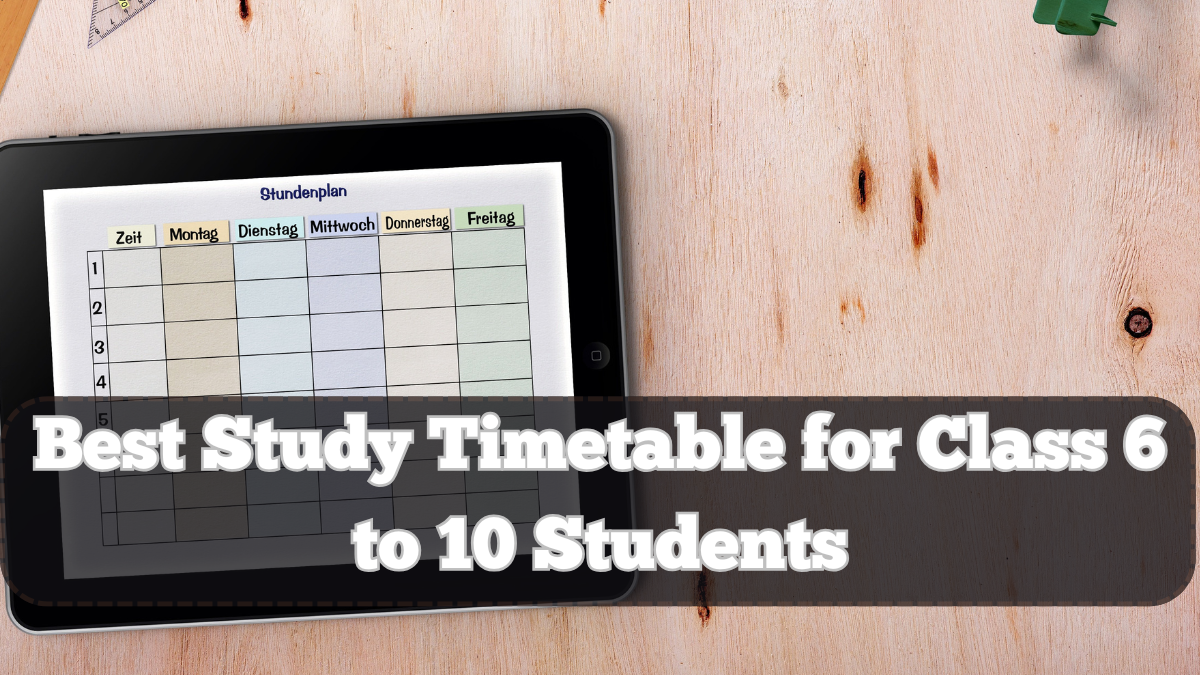Creating a well-structured study timetable is one of the most effective ways for students in Class 6 to 10 to improve learning, manage time, and prepare effectively for exams. A clear daily routine not only enhances focus but also reduces stress and procrastination. This article explains how students can design a study timetable that fits their needs and helps them excel academically. We also include expert advice from teachers and CBSE guidelines to ensure the plan is practical and aligned with curriculum demands.

Why Is a Study Timetable Important?
A study timetable helps students:
-
Organize study hours efficiently
-
Balance school work, extracurriculars, and rest
-
Avoid last-minute cramming before exams
-
Build consistent learning habits
-
Track progress and adjust plans
By following a timetable, students learn discipline and time management skills essential for academic success and lifelong growth.
How to Create the Perfect Study Timetable for Class 6 to 10
Step 1: List All Subjects and Topics
Begin by listing all subjects studied in school, including languages, math, science, social studies, and others. Break down chapters or topics that need revision or practice.
Step 2: Assess Your Daily Time Availability
Evaluate how many hours are available for studying each day, considering school hours, homework, activities, and rest. Ideally, students in Classes 6 to 8 should study 2 to 3 hours daily, while Classes 9 and 10 may need 3 to 4 hours for exam preparation.
Step 3: Prioritize Subjects Based on Difficulty
Allocate more time to challenging subjects or topics you find difficult. Make sure to balance time so no subject is neglected.
Step 4: Divide Study Sessions Into Chunks
Use focused study sessions of 30 to 45 minutes followed by short breaks. This technique, known as the Pomodoro method, improves concentration and retention.
Step 5: Include Time for Revision and Practice
Reserve regular slots for revising previously learned material and practicing sample questions or exercises.
Step 6: Keep Flexibility
Your timetable should be flexible to adjust for unexpected school activities, health, or personal reasons. Review and update your plan weekly.
Sample Study Timetable for Class 6 to 10 Students
| Time | Activity | Notes |
|---|---|---|
| 4:00 PM–4:30 PM | Homework / Review class notes | Immediately after school |
| 4:30 PM–5:00 PM | Subject 1 (e.g., Math) | Focus on difficult topics |
| 5:00 PM–5:10 PM | Break | Short rest |
| 5:10 PM–5:40 PM | Subject 2 (e.g., Science) | Include practice questions |
| 5:40 PM–6:00 PM | Reading / Language study | Vocabulary, grammar exercises |
| 6:00 PM–6:15 PM | Break | Refresh |
| 6:15 PM–6:45 PM | Revision / Quiz | Quick tests on previous lessons |
| 6:45 PM onwards | Free time / Extracurriculars | Balance is important |
Tips from Teachers for Effective Study Timetables
-
Consistency is key: Follow your timetable daily for best results.
-
Use a planner or app: Digital tools can send reminders and track progress.
-
Create a distraction-free environment: Study in a quiet place with minimal interruptions.
-
Stay hydrated and take breaks: This keeps your mind fresh and alert.
-
Set realistic goals: Avoid overloading to prevent burnout.
How CBSE Supports Study Timetable Planning
CBSE recommends balanced study plans that include breaks and varied activities. It emphasizes understanding concepts over rote memorization and encourages students to seek help from teachers whenever needed.
FAQs on Study Timetables for Students
How many hours should a Class 10 student study daily?
Class 10 students should aim for 3 to 4 hours of focused study daily, increasing closer to exams.
What if I miss a study session?
Don’t stress. Adjust your timetable to catch up, but avoid skipping frequently.
How to stay motivated while following a timetable?
Set small rewards for completing sessions and remind yourself of your goals regularly.
Should I include extracurricular activities in the timetable?
Yes, including hobbies and physical activities helps maintain a healthy balance and reduces stress.
Conclusion
A smart, well-planned study timetable tailored to your subjects and personal pace is crucial for academic success in Classes 6 to 10. By following expert tips, prioritizing difficult subjects, and maintaining consistency, students can boost their confidence and perform better in exams. Remember, balance and flexibility are important to keep your studies effective and enjoyable.
Click here to know more.
